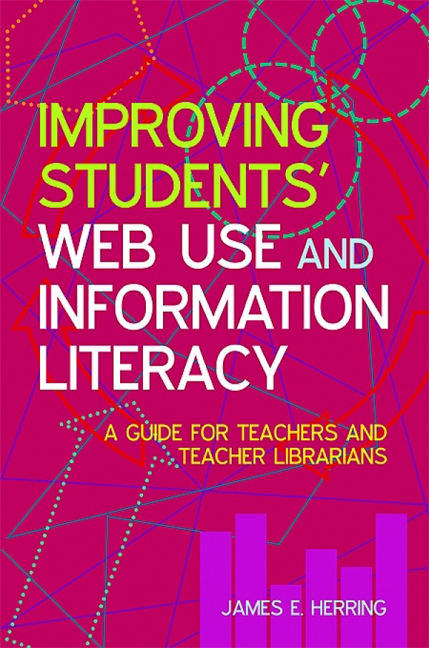Book contents
- Frontmatter
- Dedication
- Contents
- Acknowledgements
- Introduction
- 1 The big picture: learning and teaching in today's schools
- 2 Finding and using information on the web
- 3 Evaluating websites
- 4 Web 2.0 and schools
- 5 Information literacy
- 6 Improving student use of the web
- 7 Developing learning websites for student use - design and tools
- 8 Developing learning websites for student use - content
- 9 The next phase of ICT in schools
- Bibliography
- Index
3 - Evaluating websites
Published online by Cambridge University Press: 08 June 2018
- Frontmatter
- Dedication
- Contents
- Acknowledgements
- Introduction
- 1 The big picture: learning and teaching in today's schools
- 2 Finding and using information on the web
- 3 Evaluating websites
- 4 Web 2.0 and schools
- 5 Information literacy
- 6 Improving student use of the web
- 7 Developing learning websites for student use - design and tools
- 8 Developing learning websites for student use - content
- 9 The next phase of ICT in schools
- Bibliography
- Index
Summary
Introduction
In 21st-century schools web-based resources are becoming the most common way for teachers, teacher librarians and students to access information. This chapter focuses on the need for teachers and teacher librarians to be experts in evaluating websites (Chapter 7 covers how to teach students to evaluate them). The importance of effective, as opposed to cursory, website evaluation cannot be underestimated. When teachers and teacher librarians are searching the web to find relevant websites to use in teaching, or for students to use, they will ensure that they find the best possible sites for themselves and their students by evaluating potentially useful websites.
In this chapter a range of website evaluation criteria are introduced, and some examples are critically analysed. Then the author lists his evaluation criteria for websites, which can be practically applied by school staff. The chapter ends with an example of a workshop for school staff, which can be adapted to suit local needs. Being able to evaluate websites effectively is an undervalued skill in most schools, but given the increasing use of websites in schools it should be among the core competencies of today's teachers and teacher librarians.
Website evaluation criteria
Why evaluate websites?
Brown (2002) identifies a number of reasons why teachers and teacher librarians need to evaluate websites:
◆ absence of guidelines – the web allows anyone to post any kind of information on a website
◆ absence of monitoring – there is little reviewing or editing of material posted on the web, unlike that carried out for published books
◆ lack of representation – most of the material on the web is put there by a small minority of the world's population, with many countries, in particular in Africa, lacking a web presence
◆ possibility of bias – the web allows people to add propaganda to websites, and there is much commercial material on the web, which increases the likelihood of bias.
Brown (2002) argues that the ‘best form of monitoring available for teachers and students is the use of critical thinking skills and constant questioning about the validity and quality of the information being encountered on the Internet’. For teachers and teacher librarians, perhaps the most important reason for evaluating websites is that they have a professional and ethical responsibility to use the best available information they can find for their teaching and for their students to use.
- Type
- Chapter
- Information
- Improving Students' Web Use and Information LiteracyA Guide for Teachers and Teacher Librarians, pp. 35 - 46Publisher: FacetPrint publication year: 2010



